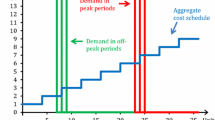Abstract
We propose a novel approach to electricity capacity procurement based on robust economic theory and extensive experience. Our approach builds upon the current best practice but allows for more flexible and gradual government purchases. Using Germany's power station strategy as an example, we suggest gradual procurement in hourly auctions over three years, which effectively mitigates market power and allows fine product granularity in time and space. Moreover, it aligns with a rational buyer's purchase and risk management strategy by enabling the purchase of a blend of forward energy and energy options that vary by time and delivery location, tailored to the buyer's specific needs. By promoting efficient pricing, competition, and innovation through coordinated forward trading, the gradual and flexible approach also addresses the shortcomings of existing capacity mechanisms and forward markets as ACER and the European Commission identified.

© Cramton, Ockenfels

© Cramton, Ockenfels

© Source: Energy-Charts.info

© Cramton, Ockenfels

© Cramton, Ockenfels
Similar content being viewed by others
Notes
See the German government's “Agreement on Power Station Strategy” press release of 5 February 2024. https://www.bmwk.de/Redaktion/EN/Pressemitteilungen/2024/02/20240205-agreement-on-power-station-strategy.html
Since 2000, electricity market experts have learned much about those challenges in restructured markets: Aagaard and Kleit 2022a, 2022b; Ambes et al. 2023; Borenstein and Bushnell 2015; Cramton 2017, 2022; Cramton et al. 2024; Cramton and Ockenfels 2012; Cramton et al. 2013; Cramton and Stoft 2006, 2007; Gimon 2020; Gramlich and Hogan 2019; Jha and Wolak 2023; Kahn et al. 2001; Macey and Ward 2021; Macey et al. 2024; Mauch et al. 2022; Patterson and Reiter 2016; Shu and Mays 2023; Watkiss et al. 2023; Wilson 2002; Wolak 2021, 2022.
It is planned that open source code will be available later this year, providing a commercial implementation of the approach we are analyzing here. The platform and tools will be tested using ERCOT market data (Cramton et al., 2024). The platform and tools will be available at no cost, requiring only customization for the German application. An expedited process will allow a thoroughly tested commercial implementation to be completed so that the procurement auctions can be conducted by the end of this year or early next year.
Alternatively, the purchase can be by load-serving entities that face a purchase requirement consistent with their current market share. The advantage of this approach is it lets the service providers decide when to purchase and in what form. However, there must be well-defined rules on how the service providers will be compensated for making the purchase. One approach is for a two-sided auction that allocates subsidy euros to service providers and simultaneously allocates those subsidy euros to producers.
Acknowledgement
Support from the German Science Foundation through the Excellence Strategy grant EXC 2126/1 390838866 is gratefully acknowledged.
Author information
Authors and Affiliations
Rights and permissions
About this article
Cite this article
Cramton, P., Ockenfels, A. Gradual and Flexible Procurement: A Note on Germany's Power Station Strategy. Z Energiewirtsch 48 (Suppl 2), 32–41 (2024). https://doi.org/10.1007/s12398-024-1276-2
Published:
Issue Date:
DOI: https://doi.org/10.1007/s12398-024-1276-2




